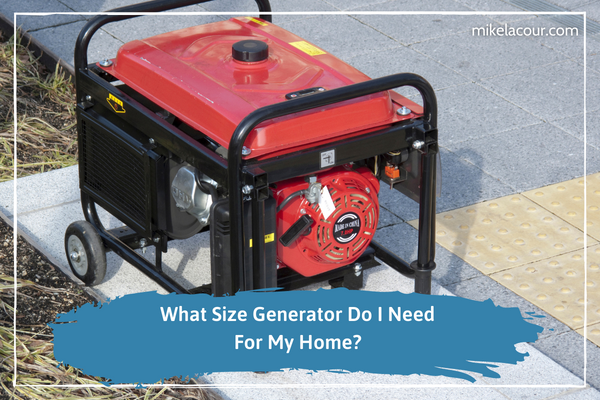What Size Generator Do I Need For My Home? Do you need to power your home in the event of a blackout?
This is an important question and one that requires careful consideration. In this comprehensive guide, we’ll provide you with detailed information on how to determine the right generator size for your home.
We’ll cover the various factors to consider when choosing a generator, such as your home’s power needs, generator capacity, generator size, type, cost, and fuel efficiency. We’ll also provide a step-by-step guide on how to calculate your home’s power needs and the generator capacity you need.

What is Generators for Home?
Generators for home are an important part of emergency preparedness. They can provide power to your home in case of a power outage or when there is no grid available. Generators can also be used for other purposes, like cooling your home in the summer or heating it in the winter.
There are two main types of generators: diesel and gasoline. Diesel generators use fuel oil, while gasoline generators use gasoline. Both have their pros and cons. Diesel generators are typically more powerful than gas generators, but they tend to be heavier and less portable. Gasoline generators are easier to transport, but they don’t produce as much power as diesel generators.
It’s important to choose the right generator for your needs. You need to consider the size of the generator, the type of fuel it uses, and the portability factor. You also need to weigh these factors against your budget and other emergency preparedness priorities.
What Size Generator Do I Need For My Home?
The size of generator you need for your home depends on the total wattage of the devices and appliances you want to use. Generally, it is recommended that you choose a generator with at least twice the wattage rating of the items you want to power up.
You should also factor in any additional electrical appliances or power tools that you may want to use in the future. It is always better to buy a larger generator than what you need now, so that it will provide enough power for more items when your needs grow.
To help you decide, here is a quick guide on how much wattage you might need:
• For basic lighting and small appliances like phone chargers, a 1,000 watt generator should be sufficient.
• To power up medium-sized appliances like refrigerators, microwaves and washing machines, you will need a minimum of 2-3 thousand watts.
• If you want to run larger items such as heaters or air conditioners at the same time, you should go for a generator with at least 6 thousand watts.
• For a fully-loaded home that has high electrical requirements, you should buy a generator with 10 thousand or more watts.
Finally, it is important to note that generators come in different types and capacities. You will need to consider your budget, the type of fuel you want to use and any other additional features that may be necessary.
We recommend consulting a professional electrician who can help you decide on the best generator size for your home. They should be able to provide you with advice and assistance regarding safety measures, installation and maintenance of the generator.
Factors to Consider When Choosing a Generator
When it comes to choosing a generator for your home, there are several factors to consider. These include:
1. Your Home’s Power Needs
The first factor to consider is your home’s power needs. Before selecting a generator, you need to determine the amount of power you need to run all the appliances and devices in your home. This includes things like refrigerators, air conditioners, lights, and other electrical devices.
You can either do this yourself or hire an electrician to do it for you. An electrician will be able to accurately calculate your home’s power needs and tell you the type of generator that will best serve your needs.
2. Generator Capacity
The capacity of a generator is the amount of electricity it can produce. The capacity of a generator is measured in kilowatts (kW). The higher the capacity, the more electricity the generator can produce. When selecting a generator for your home, it’s important to choose one with a capacity that meets or exceeds your home’s power needs.
3. Generator Size
The size of a generator is determined by its capacity. The larger the capacity, the larger the generator will be. When selecting a generator for your home, it’s important to choose one that is the right size for your needs.
4. Generator Type
Generators come in a variety of types, such as portable, standby, and inverter. Portable generators are typically smaller and less expensive, but they’re not as powerful as larger models. Standby generators are more powerful and are usually installed permanently in your home. Inverter generators are the most powerful and efficient, but they’re also the most expensive.
5. Generator Cost
Generators can range in cost from a few hundred dollars to several thousand dollars. The cost of a generator will depend on its size, capacity, type, and other features. When selecting a generator for your home, it’s important to choose one that fits within your budget.
6. Fuel Efficiency
Generators run on either gasoline, diesel, or propane. Gasoline is the most common fuel type and is the least expensive. Diesel is more fuel-efficient and produces less emissions, but it’s also more expensive. Propane is the most fuel-efficient and produces the least emissions, but it’s also the most expensive.
Calculating Your Home’s Power Needs
Once you’ve determined the type and size of generator you need for your home, the next step is to calculate your home’s power needs. This is an important step as it will help you determine the size and capacity of generator you need.
To calculate your home’s power needs, you’ll need to add up the wattage of all the electrical devices and appliances in your home. You can find the wattage of each device or appliance on the product label or in the product manual. Once you’ve added up the wattage of all the devices and appliances in your home, you’ll have an estimate of your home’s power needs.
Calculating the Generator Capacity You Need
Once you’ve calculated your home’s power needs, the next step is to calculate the generator capacity you need. To do this, you’ll need to multiply the wattage of each device or appliance by the number of hours it will be used. Then, add up the total wattage for all the devices and appliances in your home. This will give you an estimate of the generator capacity you need.
For example, if you have a refrigerator that uses 500 watts and it will be used for 8 hours a day, then you’ll need a generator with a capacity of 4,000 watts (500 watts x 8 hours = 4,000 watts).
Choosing the Right Generator Size
Once you’ve calculated the generator capacity you need, the next step is to select the right size generator. The size of a generator is determined by its capacity. As a general rule of thumb, you should choose a generator that is at least 10 percent larger than your home’s power needs. This will ensure that the generator is powerful enough to meet your home’s power needs.
Generator Types
When selecting a generator for your home, you’ll also need to consider the type of generator you need. There are three main types of generators: portable, standby, and inverter.
Portable generators are smaller and less expensive, but they’re not as powerful as larger models. Standby generators are more powerful and are usually installed permanently in your home. Inverter generators are the most powerful and efficient, but they’re also the most expensive.
Generator Costs
The cost of a generator will depend on its size, capacity, type, and other features. Generators can range in cost from a few hundred dollars to several thousand dollars. When selecting a generator for your home, it’s important to choose one that fits within your budget.
Fuel Efficiency
Generators run on either gasoline, diesel, or propane. Gasoline is the most common fuel type and is the least expensive. Diesel is more fuel-efficient and produces less emissions, but it’s also more expensive. Propane is the most fuel-efficient and produces the least emissions, but it’s also the most expensive.
Safety Considerations for Generators
Finally, it’s important to consider safety when selecting a generator for your home. Generators can be dangerous if not used correctly. Be sure to read and follow all instructions and safety warnings provided by the manufacturer.
FAQs
What are the Benefits of using a Generator?
1. What are the benefits of using a generator?
A generator can be a great way to power your home in an emergency. It can provide you with clean, safe electricity when there is no other source available. Generator fuel is also affordable and easy to find, making it a great option for long-term use.
What are the Disadvantages of using a Generator?
If you’re considering using a generator to power your home during an emergency, there are a few things to keep in mind. First, generators are not always reliable. They can break down and require maintenance, which can be time-consuming and difficult. Additionally, generators produce noise and can be disruptive. Finally, generators use fuel, which may become scarce during an emergency.
How to Choose the Right Generator for Your Needs?
When it comes to choosing the right generator for your needs, there are a few things you should keep in mind.
The size of your generator: You’ll need to decide how much power you need and what size generator will accommodate that.
The type of fuel: You’ll need to choose a generator with a compatible fuel source (like gasoline or diesel).
The features required: Some generators come with additional features like automatic start or automatic shutting off.
How Often Should I Change My Generator’s Oil?
If you are using your generator for an extended period of time, it is important to change the oil regularly. The manufacturer’s instructions will specify how often your generator should be serviced and oiled. However, a good rule of thumb is to change the oil every 3 months, or if you experience any mechanical problems with your generator.
How to Deal with an Unwanted Guest: mosquitoes
If you are hosting a party and want to keep the mosquitoes away, one effective way to do so is to use citronella candles. These candles release a strong scent that mosquitoes find unpleasant. Additionally, placing bowls of water near your gathering will help to drown out their noise and racket. And finally, wearing long-sleeved shirts and pants will help keep you cool and discourage the bugs from biting.
What are the two main types of generators?
There are two main types of generators: diesel and gas. Diesel generators work best in cold climates because they create more heat than gas generators. Gas generators are better for warm climates because they don’t create as much heat.
Conclusion
Selecting the right generator for your home can be a daunting task. However, by taking the time to understand your home’s power needs, calculating the generator capacity you need, and selecting the right generator size, type, and cost, you’ll be able to find the perfect generator for your home.
If you have any questions or need help selecting the right generator for your home, don’t hesitate to contact a qualified electrician. They can provide you with professional advice and guidance on selecting the perfect generator for your home.
By following the tips outlined in this comprehensive guide, you’ll be able to answer the important question: what size generator do I need for my home?





GIPHY App Key not set. Please check settings